|
|
|
Sort Order |
|
|
|
Items / Page
|
|
|
|
|
|
|
| Srl | Item |
| 1 |
ID:
107287
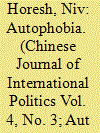

|
|
|
|
|
| Publication |
2011.
|
| Summary/Abstract |
Recent popular unrest across the Arab world has sparked fresh debate over the scope of multinational intervention in 21st-century emergent humanitarian crises and the perimeters of promoting democratization in the developing world; it has also prompted reassessment of the United States' ability to maintain its system of longstanding regional alliances in the face of economic recession at home, and amid President Obama's apparent disowning of his predecessor's ebullient pre-emptive posture.
Barack Obama's attempts to defuse visceral anti-Americanism in the Arab world have been accompanied by assurances that the United States would speed up its pull-out from Iraq and Afghanistan. Coupled with an initially less belligerent approach to Iran's nuclear program than was postulated by George W. Bush, then followed by an initially cautious reaction to the Egyptian and Libyan uprisings, Obama's foreign policy has given rise to speculations about a possible scaling-down of U.S. immersion in the Middle East in favour of focusing on domestic issues and on better managing China's rise in the Asia-Pacific region.
From Israel, through to Saudi Arabia, and Australia, allies historically vulnerable to regional isolation of various kinds observe closely the Obama Administration's reactions to the demonstrations rocking the Arab world (and Iran); analysts in these countries often wonder about the significance of Obama's professed non-belligerence to their respective national-security interests. A few on the periphery of their countries' security establishments are even propelled to speculate openly that the United States might ultimately disengage from their arena in order to focus on domestic issues, or on other parts of the world.1
Framed within this changing geo-political landscape, this article will consider the current pulses shaping the Sino-Israeli relationship against the backdrop of the great civil unrest sweeping across the Arab World. It will start by identifying the historical policy narratives that have carried over …
|
|
|
|
|
|
|
|
|
|
|
|
|
|
|
|
| 2 |
ID:
117609
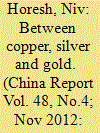

|
|
|
|
|
| Publication |
2012.
|
| Summary/Abstract |
This article provides the first comparative overview in English of Japanese colonial banks before World War II with an emphasis on their roles as banks of issue in Taiwan, Korea and Northeast China. It discusses at length similarities and differences in these banks' note circulation patterns, in their note-reserve requirements and their actual application, and in their geographical spread and respective colonial mandates. There was some variation in Japanese bank note issuance in the colonial setting of Korea and Taiwan, in 'Manchukuo' and in those parts of China that remained nominally sovereign. But all Japanese colonial banks seem, in one way or another, to have astutely adjusted the spread of their note issue in order to control for flagging demand due to nationalist boycotts, or to conversely cash in on demand spurts for notes resulting from crises in the indigenous financial sector. The banks of issue under review here were theoretically subject to a 100 per cent reserve requirement, but the make-up of their metallic bullion reserve and the degree of their notes' convertibility were very dissimilar, reflecting varying local conditions. Both in terms of reserve ratios, and note denominations-the banks prudently followed charter obligations that were devised by the Japanese Treasury but, at the same time, were reminiscent of the obligations that British overseas banks also had to abide by. Thus, the findings discussed here shed light on the inception and adaptability of Japanese colonial policy in the lead-up to the Pacific War.
|
|
|
|
|
|
|
|
|
|
|
|
|
|
|
|
| 3 |
ID:
078023
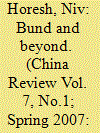

|
|
|
| 4 |
ID:
152033
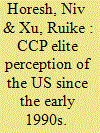

|
|
|
|
|
| Summary/Abstract |
This article juxtaposes two of the most influential yet under-studied America watchers within the top echelon of the Chinese Communist Party (CCP), Wang Huning and Zheng Bijian. To be sure, the two have indelibly shaped CCP attitudes, yet surprisingly enough, although Zheng has been written about extensively in the English language, Wang has hitherto largely remained outside academics’ purview. This article also aims, in passing, to explore linkages between Wang and Zheng ideas and those of other well- known America watchers like Liu Mingfu and Yan Xuetong. The comparison offers clues as to the extent to which the current advisory shaping CCP thinking on the US differs from the previous generation, and as to whether CCP thinking is un-American or anti-American in essence. The conclusions ties the study together by arguing, based on Wang and Zheng's views, that New Confucianism may shape Chinese society in the future
|
|
|
|
|
|
|
|
|
|
|
|
|
|
|
|
| 5 |
ID:
153240
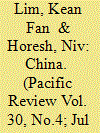

|
|
|
|
|
| Summary/Abstract |
The political-economic evolution of post-Mao China has been portrayed as a historically inevitable embrace of neoliberalism; as an exemplification of the East Asian developmental state and as an extension of Soviet New Economic Policy-style state capitalism. This paper evaluates these portrayals through a broad historical and geographical framework. It examines the position of China as a new state after 1949. It then places the shifting logics of socioeconomic regulation in China in relation to (1) the global neoliberal hegemony since the 1980s and (2) the concomitant shifts in the economic policies of Japan, South Korea and Taiwan. In so doing, the paper demonstrates how the Communist Party of China creatively adapted and re-purposed regulatory logics from the Washington Consensus and East Asian policies to consolidate its own version of Leninist state-led development.
|
|
|
|
|
|
|
|
|
|
|
|
|
|
|
|
| 6 |
ID:
154165
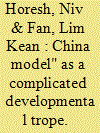

|
|
|
|
|
| Summary/Abstract |
This article complicates existing portrayals of the China developmental "'model" from two angles. First, it problematises the historical basis of what many in the advanced "First World", particularly in America, used to see as their superior model of governance. In the final analysis, the current enthusiasm in these countries about the "China model" may have nothing to do with China per se but more to do with the decline of self-celebrated Western models that are themselves ideal-typical abstractions. Second, upon re-examining its historical record, it posits the alternative "China model" as similarly problematic. Triumphant portrayals of Chinese exceptionalism by China-based scholars have been predicated on a troubled Mao-era legacy, the implications of which remain unclear for understanding the increasingly fragmented and globally involved Chinese economy. Building on this double complication, the article concludes with a call for more historically grounded and geographically variegated examinations of Chinese political-economic evolution.
|
|
|
|
|
|
|
|
|
|
|
|
|
|
|
|
| 7 |
ID:
131256
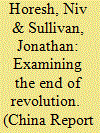

|
|
|
|
|
| Publication |
2014.
|
| Summary/Abstract |
Wang Hui is a significant contemporary Chinese thinker and a key representative of Chinese New Left thought. This article provides a critical review of some of the themes that emerge from Wang's The End of Revolution as a means of situating his position in China's intellectual landscape, with a particular mind to exploring the historicity of Wang's thought as it informs his views. The essay engages some of the key discursive threads in The End of Revolution and provides a critical overview of Wang's positions on neoliberalism, the tension between Western articulations of modernity and China's own self-image.
|
|
|
|
|
|
|
|
|
|
|
|
|
|
|
|
| 8 |
ID:
172561
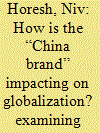

|
|
|
|
|
| Summary/Abstract |
This article is aimed at better understanding China's Overseas Foreign Direct Investment (OFDI) choices through a post-War Japanese historical perspective. It will focus in the main on OFDI as a marker of an advanced stage of the East Asian ‘developmental state’ formula, wherein the ‘China Brand’ takes shape. The transition process from heavy-industry and low-value added goods to frontier-technology manufacturing with global brand recognition will be placed under scrutiny. A Japanese perspective is called for, as much of the theory in the field of international business to do with OFDI and the growth of multinational corporations (MNCs) is currently primarily derived from a Western developed-economy setting, and hence does not seek to offer much in the way of predictive insight about all-important yet middle-income China, as it proceeds towards becoming the largest economy on the planet. The article surveys the historical trajectory of Chinese OFDI, underling its correlation with inbound foreign investment into China; it then offers a comparative view of Japanese OFDI in the pre- and post-War era. It then assesses Chinese brand strength in the electrical appliance, automobile, and IT areas. Finally, it offers a prognosis as to the future direction of Chinese OFDI, and how it might affect the contours of globalization as well as Sino-American rivalries.
|
|
|
|
|
|
|
|
|
|
|
|
|
|
|
|
| 9 |
ID:
124991
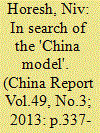

|
|
|
|
|
| Publication |
2013.
|
| Summary/Abstract |
The 'China Model' literature in English was until recently quite peripheral and rather ahistoric in nature. It was mainly penned by economists and other social scientist who aimed at generalising how China's reforms worked since 1978. Historians, to the extent they tried at all to find linkages between Deng Xiaoping's reforms and China's pre-1978 heritage, were rather minimalistic in their approach. And since many economists reduced China's achievements to the inflow of foreign investment in pursuit of cheap labour and tax breaks, many historians also tended to view the Special Economic Zones set up by Deng as merely reincarnations of a well-tried formula whereby Westerners were allowed to set up autonomous and bustling treaty ports along the China coast in the later part of the 19th century. In short, it was often suggested that the reforms the PRC had embarked on in 1979 were not so boldly original or ingenious as might be otherwise assumed. Yet, because PRC social scientists in their advisory capacity are more tightly linked with government than in the West, one can freely come across in the Chinese literature very sober and historicised academic accounts of the challenges the country is facing domestically and internationally, so long as the Party's monopoly on power is not challenged directly. The following passages address an important book in that vein by prominent Tsinghua University professor, Yan Xuetong, that was recently translated into English. It is not a monograph in the strict sense of the word, but makes for a compilation of articles from various stages of the author's career. Thus, Yan's book offers stimulating insights on how China's pre-modern past might inform the nature Chinese ambitions for global leadership in the future
|
|
|
|
|
|
|
|
|
|
|
|
|
|
|
|
| 10 |
ID:
121986
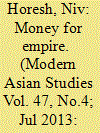

|
|
|
|
|
| Publication |
2013.
|
| Summary/Abstract |
Over the last three decades, a considerable body of English-language academic work has shed much light on Japan's empire-building project in Greater China during the first half of the twentieth century. At the same time, Japanese-language studies of the country's pre-war financial history have also grown in leaps and bounds. Yet, to date, neither body of literature seems to have fully examined what might appear to the naked eye as one of the critical pre-war junctures, where Japanese financial history converged on imperial policy and Chinese nationalist responses thereto.1 This paper will therefore aim to fill part of the gap by examining how the Yokohama Specie Bank, arguably the backbone of Japanese finance in China Proper, was affected by Chinese anti-foreign boycotts throughout the pre-war era (1842-1937).
|
|
|
|
|
|
|
|
|
|
|
|
|
|
|
|
| 11 |
ID:
179342
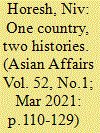

|
|
|
|
|
| Summary/Abstract |
The 19th Chinese Communist Party (CCP) Congress, held in October 2017, enshrined not just Xi Jinping's grip on power. It also re-coated its ideology with a medley of Socialist and traditionalist buzz words that had been marginalized in the 1980s. During the height of the reform era, these increasingly made way for ideas borrowed from market economies. Predictably enough, the ideological ferment surrounding the 19th Party Congress has since also played out in the realm of education. This article examines in detail the most current history textbooks used in PRC classrooms to construe China's pre-Imperial and Imperial past. To that end, included in my exploration will not just be changing PRC attitudes to the Chinese past, but also PRC instruction of world history from antiquity to the early modern era. In passing, I will also compare the school material with the latest authoritative Western scholarly studies of the same topics by way of eliciting how PRC official historical narratives of events preceding the 20th century diverge from Western ones.
|
|
|
|
|
|
|
|
|
|
|
|
|
|
|
|
| 12 |
ID:
149746


|
|
|
|
|
| Summary/Abstract |
The “Singapore model” constitutes only the second explicit attempt by the Chinese Communist Party (CCP) to learn from a foreign country following Mao Zedong's pledge to contour “China's tomorrow” on the Soviet Union experience during the early 1950s. This paper critically evaluates policy transfers from Singapore to China in the post-Mao era. It re-examines how this Sino-Singaporean regulatory engagement came about historically following Deng Xiaoping's visit to Singapore in 1978, and offers a careful re-reading of the degree to which actual policy borrowing by China could transcend different state ideologies, abstract ideas and subjective attitudes. Particular focus is placed on the effects of CCP cadre training in Singaporean universities and policy mutation within two government-to-government projects, namely the Suzhou Industrial Park and the Tianjin Eco-City. The paper concludes that the “Singapore model,” as applied in post-Mao China, casts institutional reforms as an open-ended process of policy experimentation and adaptation that is fraught with tension and resistance.
|
|
|
|
|
|
|
|
|
|
|
|
|
|
|
|
| 13 |
ID:
152714
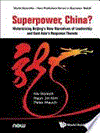

|
|
|
|
|
| Publication |
Singapore, World Scientific Publishing Co. Pte. Ltd., 2015.
|
| Description |
xv, 137p.hbk
|
| Series |
World Scientific - Now Publishers Series in Business; Vol. 6
|
| Standard Number |
9789814619158
|
|
|
|
|
|
|
|
|
|
|
|
Copies: C:1/I:0,R:0,Q:0
Circulation
| Accession# | Call# | Current Location | Status | Policy | Location |
| 059027 | 327.5105/HOR 059027 | Main | On Shelf | General | |
|
|
|
|
|
|
|
|
|